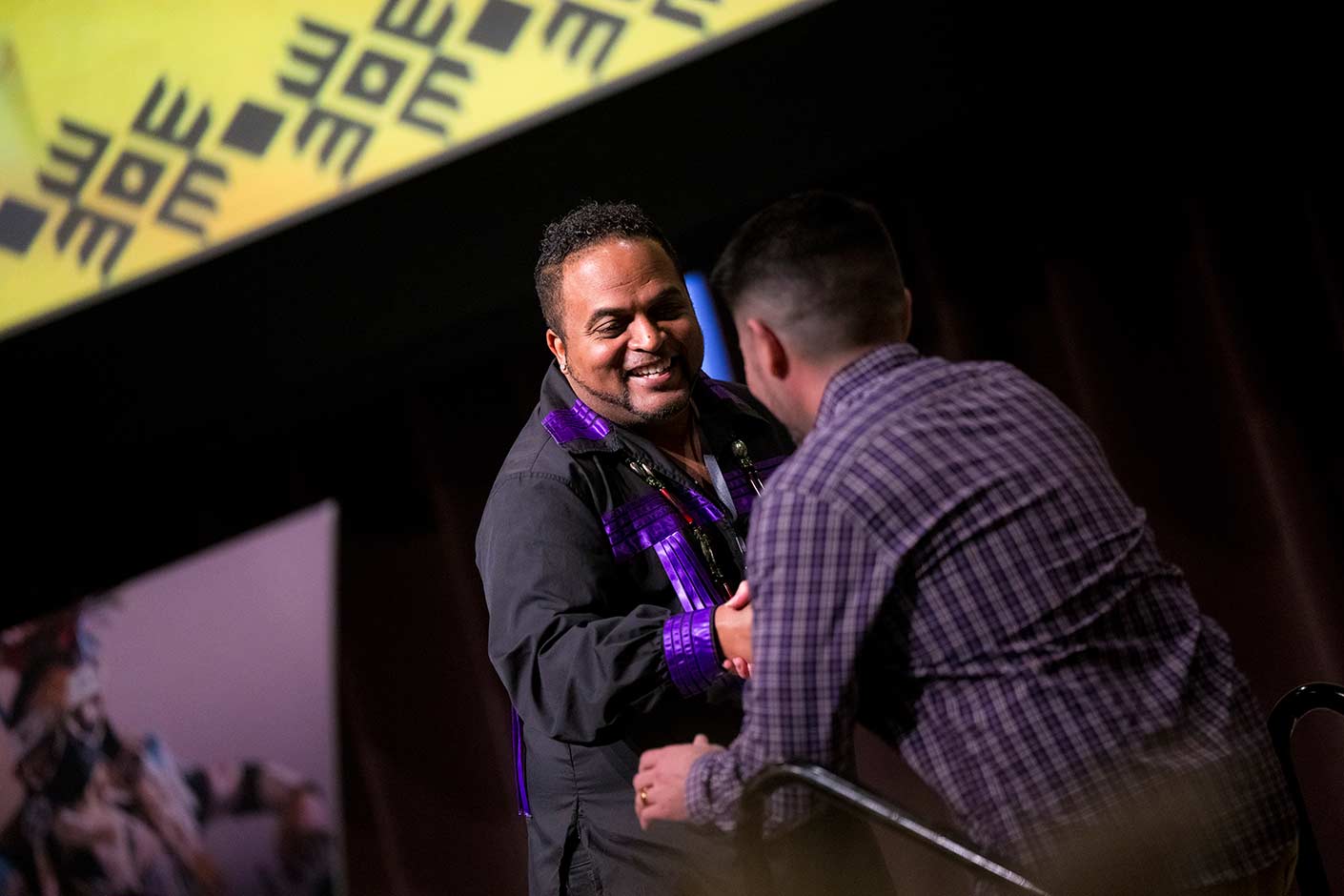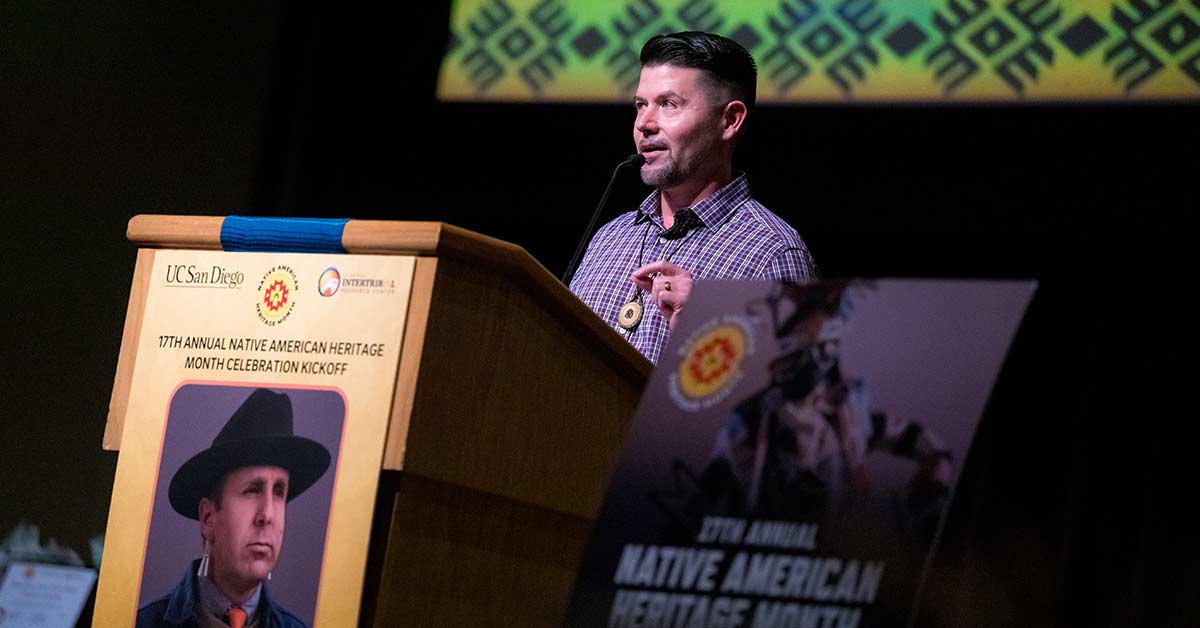Culture Bearer on Campus
New initiative of the Native American and Indigenous Studies (NAIS) program aims to promote awareness and understanding of the history, culture and life experiences of Native Americans in the region
Published Date
Story by:
Media contact:
Topics covered:
Share This:
Article Content
The idea of bringing in a Native American cultural ambassador to campus began to take shape four years ago. That was when UC San Diego professor and Ethnic Studies Chair Andrew Jolivétte, his fellow faculty members and the leadership of the Intertribal Resource Center started exploring more ways to strengthen ties between the university and Indigenous peoples in the region.
“We wanted all students, faculty and staff to think about issues of importance to the first peoples of this territory,” said Jolivétte, also the founding director of the university’s Native American and Indigenous Studies (NAIS) program.
The vision became a reality with the recent naming of Ethan Banegas as UC San Diego’s inaugural NAIS Culture Bearer in Residence. The appointment, hosted by Ethnic Studies and the campus Intertribal Resource Center, was made possible with funding from the Mellon Foundation, the UC San Diego Yankelovich Center for Social Science Research and the UC San Diego School of Social Sciences.

Banegas’ appointment became effective in November, celebrated on campus and nationwide as Native American Heritage Month.
"I think it helps Native students to see themselves and to know that UC San Diego values the experiences of people like them in a really affirming way,” Jolivétte said. “It will build greater awareness and understanding of Native culture in the campus community.”
Banegas, a descendant of the Kumeyaay, Luiseño/Payómkawichum, and Cupeño/ Kuupangaxwichem bands of Native Americans, grew up on the Barona Indian Reservation. He earned his bachelor’s degree from the University of San Diego (USD), majoring in political science, theology and history and a master’s degree in history, also from USD. He taught Kumeyaay history at Kumeyaay Community College for four years and now teaches federal Indian Law, tribal gaming, and Indian history in popular culture at San Diego State University.
His involvement in the Kumeyaay community runs deep. He has served on the Board of Directors at Kumeyaay Community College and Barona Museum and has published scholarly papers relating to Kumeyaay history. He is co-owner of kumeyaay.com, a website dedicated to the promotion and preservation of Kumeyaay culture. He is also a historian for the San Diego History Center which operates the Junipero Serra Museum.
In 2021-22, Banegas served as a community organizer for the Intergenerational Health and Healing Program, a collaborative project that brought together UC San Diego Ethnic Studies and San Diego-area community organizations for an exploration of intergenerational issues among Indigenous and refugee youth through a series of podcasts, writing workshops and music.
Historian. Storyteller. Role Model
As Culture Bearer in Residence, Banegas will present a series of lectures, open to the entire campus community, in the 2023-24 academic year. He will draw upon his experiences of growing up on the Barona Indian Reservation and his knowledge of the history and culture of Kumeyaay people.

Banegas will also weave in what he learned from his in-depth videotaped interviews with 31 elders and knowledge carriers as part of the Kumeyaay Oral History Project. Fifty-six hours of interview footage and1,200 pages of transcripts, all contained in a hard disk drive, are available to the campus community in the Department of Ethnic Studies. Among those interviewed for the project were Banegas’ late father Larry of the Barona band, a social worker, educator and Indian rights activist; Angela Elliot Santos, Chairwoman of Manzanita; Anthony Russel Pico, Chairman of Viejas; Harry “Paul” Cuero Jr, Chairman of Campo; Josephine “Sister” Romero, Chairwoman of Barona; and Daniel James Tucker, Chairman of Sycuan.
“The project captures the incredible diversity and intelligence within the Kumeyaay Nation,” Banegas said. “We are not a monolith. On various topics from blood quantum, enrollment, Indian gaming and education to how culture and tradition should be practiced in a modern world, there is not just one ‘right’ way, but many.”
In his talks, he will aim to dispel prevailing misconceptions about Native people. One such fallacy is that the advent of casino gambling has made all Native Americans wealthy, Banegas said.
“The reality is that most Indians are still trying to address social and economic deficits from the history we have. For example, there are unique challenges on reservations that make it difficult for tribal members to attain a degree.”
Banegas also hopes to show up as a role model to Native students on the UC San Diego campus.
“I had a lot of good mentors and that’s the reason I am here, but I really didn’t have a lot of Native mentors. I seldom had a Native mentor to help me navigate the most challenging moments in my college years,” he said. “We have issues that are very unique to being Native American and I see myself as a bridge for Native students to find their way as they move toward their future careers. I believe it is especially important for Native educators and scholars that once we get to where we are going, we turn around and help the next in line.”
Looking ahead, Ethnic Studies Chair Jolivétte hopes to expand the initiative to bring in cultural experts from other communities to UC San Diego.
“Culture bearers are knowledge keepers. I would love for this to be a model for other communities to think about as well,” he said.
Topics covered:
Share This:
You May Also Like
Stay in the Know
Keep up with all the latest from UC San Diego. Subscribe to the newsletter today.



